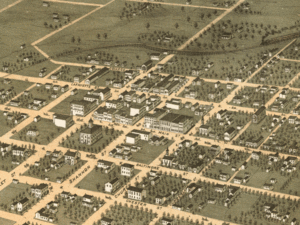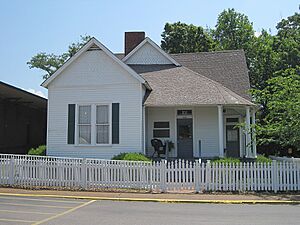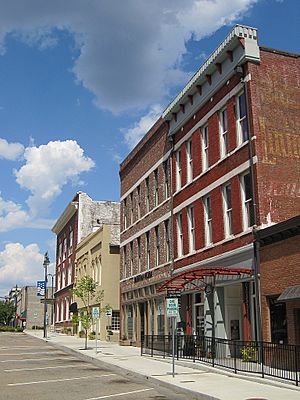Jackson, Tennessee facts for kids
Quick facts for kids
Jackson, Tennessee
|
|||
|---|---|---|---|
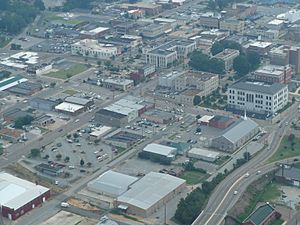
Aerial View of Jackson
|
|||
|
|||
| Nickname(s):
Hub City
|
|||
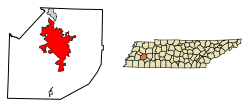
Location of Jackson in Madison County, Tennessee
|
|||
| Country | United States | ||
| State | Tennessee | ||
| County | Madison | ||
| Founded | 1821 | ||
| Incorporated | 1845 | ||
| Named for | Andrew Jackson | ||
| Area | |||
| • Total | 58.75 sq mi (152.17 km2) | ||
| • Land | 58.74 sq mi (152.14 km2) | ||
| • Water | 0.01 sq mi (0.03 km2) | ||
| Elevation | 410 ft (125 m) | ||
| Population
(2020)
|
|||
| • Total | 68,205 | ||
| • Density | 1,161.07/sq mi (448.30/km2) | ||
| Time zone | UTC−6 (Central) | ||
| • Summer (DST) | UTC−5 (CDT) | ||
| ZIP Codes |
38301-38303, 38305, 38308, 38314
|
||
| Area code(s) | 731 | ||
| FIPS code | 47-37640 | ||
| GNIS feature ID | 1289178 | ||
| Website | City of Jackson Official Website: http://www.jacksontn.gov/ | ||
Jackson is a city in Madison County, Tennessee, United States. It is the main city of the county. Jackson is about 70 miles east of Memphis. It is an important city for trade in West Tennessee. In 2020, about 68,205 people lived there.
Jackson is the main city in the Jackson, Tennessee metropolitan area. This area also includes Humboldt, Tennessee. Jackson is the biggest city in Madison County. It is also the second biggest city in West Tennessee, after Memphis. The Tennessee Supreme Court has a courthouse in Jackson for West Tennessee. This was set up in 1834 because Jackson was the biggest city in the west back then.
Before the Civil War, Jackson was a trading center for farms. These farms grew a lot of cotton. Starting in 1851, Jackson became a major railroad center. These railroads connected the city to big markets in the north, south, east, and west. This helped Jackson grow a lot. Many people came to work on the railroads in the late 1800s. By the 1960s, 15 passenger trains came through Jackson every day. But changes in the railroad industry meant fewer trains and jobs. Now, the city's economy has changed to include new businesses and manufacturing.
Contents
History of Jackson, Tennessee
Early Days of Jackson
Long ago, the Chickasaw people lived in this area. European-American settlers later moved them out.
European-American settlers started living near the Forked Deer River before 1820. Many came from places like Virginia and Kentucky. The city was first called Alexandria. But in 1822, it was renamed Jackson. This was to honor General Andrew Jackson, a hero from the War of 1812. He later became the President of the United States.
The state of Tennessee officially created the City of Jackson in 1821. It was meant to be a main city for several counties. The law said that 50 acres of land needed to be given to the city. Jackson was chosen as the best spot because it was close to most of the settlers.
When the Tennessee Supreme Court was created in 1834, Memphis was not yet a big city. Jackson was the most important city in West Tennessee. So, it was chosen as a site for the State Supreme Court in this part of the state.
Jackson did not have public elections until 1837. A group called the Board of Aldermen was elected to lead the city. From 1854 to 1915, Jackson had eight aldermen elected from four areas. After the Civil War, formerly enslaved people and free Black people were allowed to vote. Before that, they could not vote in Tennessee.
The area around Jackson was used for farming. Many cotton farms were set up. These farms relied on the labor of enslaved African Americans. As the main city of the county, Jackson was a place for trading and shopping for the farms nearby.
Jackson During the Civil War and Late 1800s
In 1862, Union soldiers took control of Tennessee. They stayed until General Grant decided to focus his efforts further south. From December 1862 to January 1863, there was a battle in Jackson. Confederate General Nathan Bedford Forrest wanted to stop the Union army's supply lines. He aimed to destroy the Mobile & Ohio Railroad that ran through Jackson. If he did, the Union army would have to stop their plans.
Forrest's cavalry crossed the Tennessee River on December 17. Union General Jeremiah C. Sullivan gathered soldiers in Jackson. Forrest's troops defeated Union cavalry in Lexington, Tennessee on December 18. The next day, Forrest continued his advance. Union forces tried to stop him northeast of Jackson.
At Old Salem Cemetery, Union soldiers fought back a Confederate attack. They then moved closer to the city. This fight was a trick to keep Jackson's Union defenders busy. Meanwhile, two Confederate groups destroyed railroad tracks north and south of the town. After this, Forrest left Jackson to attack other towns. Because the railroad was destroyed, the Union army changed its plans. They decided to attack Vicksburg instead of invading Mississippi from Tennessee.
Union troops left Jackson and moved to Memphis. Memphis became a major base for Union forces during the war. Forrest returned to Jackson in early 1864. He used the city as his base to attack Union positions. He came back again later that year to plan attacks on Union river traffic.
After slavery ended and new laws were passed, Black people in Jackson could vote. But in the late 1800s, the state government made it harder for many Black people and poor white people to vote. They passed laws like requiring a poll tax.
Geography of Jackson
Jackson is located at 35°37′59″N 88°49′15″W / 35.63306°N 88.82083°W.
The United States Census Bureau says the city covers about 49.5 square miles (128 square kilometers). All of this area is land.
Population and People of Jackson
| Historical population | |||
|---|---|---|---|
| Census | Pop. | %± | |
| 1850 | 1,006 | — | |
| 1860 | 2,407 | 139.3% | |
| 1870 | 4,119 | 71.1% | |
| 1880 | 5,377 | 30.5% | |
| 1890 | 10,039 | 86.7% | |
| 1900 | 14,511 | 44.5% | |
| 1910 | 15,779 | 8.7% | |
| 1920 | 18,860 | 19.5% | |
| 1930 | 22,172 | 17.6% | |
| 1940 | 24,332 | 9.7% | |
| 1950 | 30,207 | 24.1% | |
| 1960 | 34,376 | 13.8% | |
| 1970 | 39,996 | 16.3% | |
| 1980 | 49,258 | 23.2% | |
| 1990 | 48,949 | −0.6% | |
| 2000 | 59,643 | 21.8% | |
| 2010 | 65,211 | 9.3% | |
| 2020 | 68,205 | 4.6% | |
| Sources: | |||
Jackson is the main city of the Jackson-Humboldt Combined Statistical Area. This area includes Chester and Madison counties, and Gibson County. In 2020, about 180,509 people lived in this combined area.
Population in 2020
| Race | Num. | Perc. |
|---|---|---|
| White (not Hispanic) | 31,116 | 45.62% |
| Black or African American (not Hispanic) | 29,878 | 43.81% |
| Native American | 109 | 0.16% |
| Asian | 1,097 | 1.61% |
| Pacific Islander | 9 | 0.01% |
| Other/Mixed | 2,509 | 3.68% |
| Hispanic or Latino | 3,487 | 5.11% |
In 2020, there were 68,205 people living in Jackson. There were 25,925 households and 16,075 families.
Population in 2010
In 2010, Jackson had 65,211 people. There were 25,191 households and 15,951 families. The city had about 1,317 people per square mile. There were 28,052 housing units. Since 2010, the city has grown by about 9.4 square miles.
The people living in Jackson were:
- 49.2% White
- 45.07% African American
- 0.2% Native American
- 1.2% Asian
- 0.02% Pacific Islander
- 2.3% from other races
- 1.5% from two or more races.
About 4.0% of the population was Hispanic or Latino.
In the city, 24.7% of people were under 18 years old. 13.4% were 18 to 24. 25.4% were 25 to 44. 23.8% were 45 to 64. And 12.7% were 65 or older. The average age was 33.8 years. For every 100 females, there were about 87.4 males.
The average income for a household was $38,169. For a family, it was $45,938. About 15.6% of families and 21.6% of all people lived below the poverty line. This included 36% of those under 18 and 8.24% of those 65 or older.
Arts and Culture in Jackson
Casey Jones Home & Railroad Museum
In 1956, the city of Jackson bought the home of famous train engineer, Casey Jones. They turned it into a museum. The museum opened on April 30, 1956. In 1978, the home and museum were moved to a new spot near Interstate 40.
Ned R. McWherter West Tennessee Cultural Arts Center
A large part of downtown Jackson is now an official Arts District. It is home to the Ned R. McWherter West Tennessee Cultural Arts Center, also known as "The Ned." It also has The Carnegie Center for Arts and History. You can see murals, live shows, art galleries, concerts, and ballet here. The district also has many small shops.
Carl Perkins Civic Center
The Carl Perkins Civic Center was built in 1973. It is a large building for events that can hold 2,200 people. It is named after the singer Carl Perkins. The center is located in the southern part of downtown.
Sports in Jackson
College Sports Teams
Jackson has several colleges with sports teams. These include Union University, Lane College, and Jackson State Community College.
Union University's women's basketball team has won many national titles. They won six NAIA national titles (1998, 2005, 2006, 2009, 2010). They also won an NCCAA title in 2014. In 2018, they made it to the Final Four in the NCAA Division II women's basketball tournament. Union also has NCCAA national titles in volleyball (2003), men's soccer (2004), and softball (2001, 2002, 2004, 2013).
Minor League Baseball in Jackson
The Jackson Generals were a Double-A Minor League Baseball team. They played at The Ballpark at Jackson from 1998 to 2020. After 2020, they were no longer part of Major League Baseball's minor league system. The Generals stopped playing in 2021 after a legal disagreement with the city.
The team was first called the West Tenn Diamond Jaxx. They changed their name to the Generals in 2011. This new name honored earlier Jackson Generals teams from the 1930s to 1950s. Other past teams in Jackson included the Jackson Jays, Giants, Blue Jays, Climbers, and Railroaders.
In 2021, the Winnipeg Goldeyes baseball team played temporarily in Jackson. They are from Canada, but couldn't play at home due to COVID-19 rules. They played 33 games in Jackson.
In 2022, professional baseball returned to Jackson. The Jackson Rockabillys of the Prospect League now play at The Ballpark at Jackson.
Other Sports in Jackson
The Hub City Hurricanes basketball team played in Jackson for one season in 2007. The Jackson Jammers also played basketball in 1992.
In 1974, a Little League team from Jackson played in the 1974 Little League World Series. They are the only team from West Tennessee to ever do this.
From 1990 to 2011, Jackson hosted the NAIA Women's Division I National Championship tournament. This big basketball event took place at the Oman Arena.
The Jackson TN Underdawgs basketball team has played in The Basketball Tournament since 2016. They are known for beating higher-ranked teams. In 2021, they were ranked 15th but beat the number 2 team in their region. In 2016, they upset the number 1 team.
Parks and Fun in Jackson
- Jackson hosts the Miss Tennessee Volunteer Pageant and the Miss Volunteer America Pageant.
- The West Tennessee Healthcare Sportsplex is a large complex for baseball and softball. It was finished in 2007.
- A tennis complex in northern Jackson hosts the City Closed tennis tournament.
- Jackson is home to Rusty's TV & Movie Car Museum. It has cars from TV shows and movies. One car is the green Mitsubishi Eclipse from the first "Fast and Furious" movie.
Education in Jackson
Colleges and Universities in Jackson
- Jackson State Community College
- Lane College
- Union University
- University of Memphis at Lambuth
- University of Tennessee at Martin – Jackson Center
The Tennessee College of Applied Technology at Jackson is near the city.
Schools for Kids in Jackson
Public schools in Jackson are run by the Jackson-Madison County School System. High schools include:
- Jackson Central-Merry Early College High School
- Liberty Technology Magnet High School
- Madison Academic Magnet High School
- North Side High School
- South Side High School
Special schools run by the State of Tennessee include:
- West Tennessee School for the Deaf
Private schools in Jackson include:
- Jackson Christian School
- Sacred Heart of Jesus High School
- Trinity Christian Academy
- University School of Jackson
Media in Jackson
Newspapers in Jackson
Jackson has one daily newspaper, The Jackson Sun. The Sun is delivered to 13 counties. It is one of the main newspapers in western Tennessee.
Television in Jackson
The Jackson television market is the smallest in Tennessee. It is served by three main TV stations:
- WBBJ-TV 7 (ABC, with CBS/MeTV on DT3)
- WJKT 16 (Fox)
- WNBJ-LD 39 (NBC)
Jackson also has a PBS station, WLJT-DT 11, and other smaller stations.
Radio Stations in Jackson
Jackson has 28 FM and 8 AM radio stations.
City Services and Transportation in Jackson
Transportation in Jackson
Getting Around by Ground
Interstate 40 goes through Jackson from east to west. It connects the city to Memphis in the west and Nashville in the east. I-40 has six exits in Jackson. U.S. Route 45 runs north to south.
The Jackson Transit Authority offers bus service within the city. The Greyhound Bus line provides bus service between cities.
U.S. Route 45, also called Highland Avenue, goes north to south. A bypass of US 45, called the Keith Short Bypass, runs through the western part of the city.
U.S. Route 412 goes east from Lexington and northwest to Dyersburg. U.S. Route 70 (State Route 1) runs east to west between Huntingdon and Brownsville.
Air Travel
McKellar-Sipes Regional Airport (MKL) serves the city of Jackson.
Healthcare in Jackson
West Tennessee Healthcare is the public hospital system for Jackson. It was created in 1949. The city helps choose some of the people who run the hospital system.
Famous People from Jackson
- Jessi Alexander, singer/songwriter
- Allison Alderson, former Miss Tennessee
- Monroe Dunaway Anderson, a cotton trader who helped start the M. D. Anderson Foundation and the University of Texas MD Anderson Cancer Center
- Micajah Autry, a hero of The Alamo, practiced law in Jackson
- Big Maybelle, R&B singer
- Dick Davis, football player
- Gene Evans, actor
- Steve Fossett, aviator, the first person to fly solo non-stop around the world in a hot air balloon, was born in Jackson
- Greg Goff, baseball coach
- Jabari Greer, football player
- Hayes Nance, orthodontist
- Thomas Harris, author of The Silence of the Lambs, was born in Jackson
- Sylvester Hicks, NFL player
- Joe Hunter, pianist for Motown hits
- Adam Huntsman, lawyer and politician
- Luther Ingram, singer
- Casey Jones, a brave train engineer who saved passengers' lives
- Christopher Jones, actor
- Ed "Too Tall" Jones, football player
- Jacoby Jones, football player who went to Lane College in Jackson
- Van Jones, environmental and civil rights activist, lawyer, was born in Jackson
- Richard D. King, architect
- Fred Lane, football player who went to Lane College in Jackson
- Denise LaSalle, blues singer, lived in Jackson for many years
- Ron Lollar, Tennessee state representative
- Wink Martindale, game show host
- Mike Norton, comic book artist and writer
- Kenny Parchman, rockabilly musician
- JR Payne, women's basketball coach
- Carl Perkins, singer, lived in Jackson; the Civic Center is named for him
- Casey Prather, basketball player
- Lauren Pritchard, soul singer and actress, spent her childhood in Jackson
- Ron Reynolds, Texas politician
- Joe Rogers, Sr., co-founder of Waffle House, was born in Jackson
- Josh Robbins, HIV/AIDS activist and blogger, grew up in Jackson
- Gil Scott-Heron, musician, spent his early childhood in Jackson
- Charles Alexander Shaw, United States District Court judge
- Trey Teague, football player
- Isaac Burton Tigrett, co-founder of the Hard Rock Cafe
- Al Wilson, football player
See also
 In Spanish: Jackson (Tennessee) para niños
In Spanish: Jackson (Tennessee) para niños





